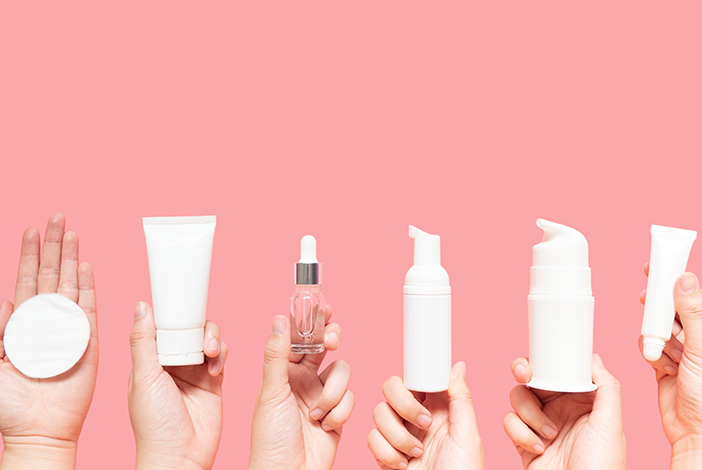
From treating leftover sun damage from the summer to dealing with winter dryness, dermatologists share how, and why, you should change your skin care regimen to address your skin care woes that come with the season.
Use a humidifier
“Wintertime, with its low humidity both outdoors and indoors, tends to leach the water content out of the outermost layers of the skin, or the epidermis and stratum corneum,” notes Dr. Michelle Hure of OC Skin Lab. To remedy this, boost the humidity of your environment by investing in a humidifier, like the Honeywell Cool Mist Ultrasonic Humidifier. If you’re traveling, Flight Mode Cloud Mister helps boost hydration on the go. Hint: Using distilled water prevents mineral build-up.
Limit showers to eight minutes
Cold weather might make you want to take steaming hot showers — but don’t. “Long or frequent baths or showers, particularly in hot water, can also dry out the skin because they remove protective oils naturally produced by the skin,” says Hadley King, New York-based dermatologist. Use temperate water and gentle cleansers like the Blissoma Free Rejuvenating Herbal Gel Cleanser + Makeup Remover as it’s safe for even the most sensitive skin on the face, while Bathing Culture Mind and Body Wash is gentle on the body.
Layer body oil under your lotion
“Increasing the humidity inside [and] using any moisturizing lotion is a great way to prevent itchy skin” notes Dr. Ron Moy, founder of DNA Renewal. Moisturize the body while it’s still damp after bathing, using an oil or serum under your moisturizer if you are prone to itchiness. Using Saint Jane Beauty Luxury CBD Body Serum or a balm like the OSEA Anti-Aging Body Balm will keep you silky smooth all season long.
Drink more liquids
When it’s chilly outside, you’re less likely to drink enough water throughout the day. “Staying hydrated from the inside out is crucial,” says Gary Goldfaden, dermatologist and founder of Goldfaden MD. “Make sure to increase your liquid ingestion during the winter.” He points out that TEA, water, green juices, bone broth, and healthy soups are a great way to increase your intake of liquids. Hydrate skin from within by sipping on Bare Bones Bone Broth Instant Beverage Mix or a drinkable beauty supplement like the Arbonne Skin Elixir Collagen Builder with Hyaluronic Acid.
Use a thicker moisturizer
Dry skin is more susceptible to moisture loss, irritation, itching, and inflammatory reactions like eczema, all due to the compromised moisture barrier. “Attention to facial moisturization is more important in winter months,” states Craig Kraffert, a board-certified dermatologist and president of Amarte Skincare. “While BB cream alone or over a serum may work well in the summer, during winter months a moisturizing cream under the BB cream may perform better.” Anfisa Skin Lilou Regenerating Balm is a top-rated balm that seals in extra hydration and concentrated antioxidants, linoleic acids, and nutrients.
Opt for emollients like hyaluronic acid
King points out that thicker emollients help restore moisture lost through the skin barrier. Hyaluronic acid is fifteen times as hydrating as water and plumps the skin, which means you can wave goodbye to fine lines and wrinkles. Add freeze-dried hyaluronic acid to any serum you own courtesy of Rael Moisture Melt Snowball or quench skin overnight with our luxury pick, Orveda Overnight Skin Recovery Masque.
Tend to the skin barrier like glycolipids
“Replicas of the oils we have in childhood are now available as skin care ingredients,” explains Dr. Loretta Ciraldo, Miami-based dermatologist and founder of Dr. Loretta Skincare. “These will be listed as glycolipids.” You can also search for ceramides, collagen, niacinamide, and more. Dr. Loretta Intense Replenishing Serum is packed with glycolipids for this very purpose, while Skin Design London Sleeping Beauty Midnight Collagen Feast uses humectant plant collagen to keep hydration in overnight.
Exfoliate gently but thoroughly
Kraffert suggests picking a mild, physical exfoliant during the winter, while Goldfaden explains that chemical exfoliants should be decreased in frequency. “Exfoliation is perhaps more important in the winter as the skin has a tendency to dry and flake more,” begins Kraffert. “Mild but thorough exfoliation is essential for optimizing the skin’s health and beauty.” For a chemical exfoliant, Dr. Loretta Micro Peel Peptide Pads rely on red algae and kola seed extracts to make the exfoliation process gentler. If you prefer a physical exfoliant, try using Goldfaden MD Doctor’s Scrub Exfoliator once per week (or as needed).
Decrease use of harsh active ingredients like retinols
“I recommend [patients] reduce the strength of retinols, and reduce the number of times they use other drying ingredients during the week,” Dr. Morgan Robach, a board-certified dermatologist and co-founder of LM Medical explains. That also includes retinol, benzoyl peroxide, salicylic acid, and glycolic acid. For instance, Biologique Recherche Lotion P50 W is the gentler form of the cult-favorite exfoliant, Lotion P50. For a gentler retinol, Amarte Wonder Cream buffers the skin from the active using vitamin E and hyaluronic acid.
xx, The FabFitFun Team





